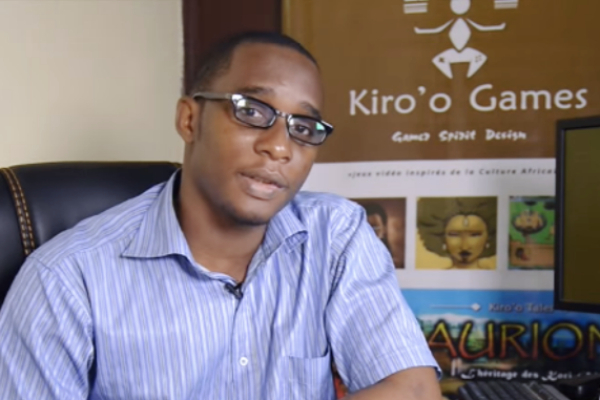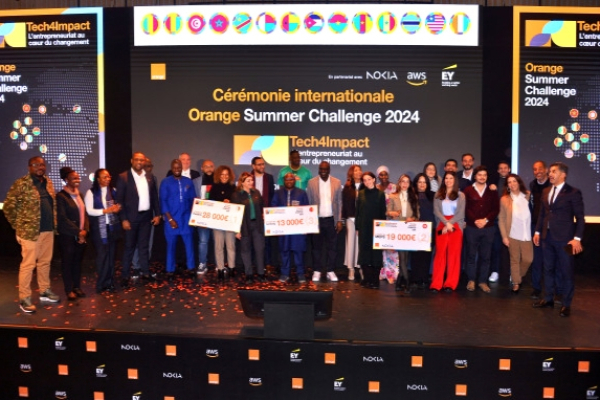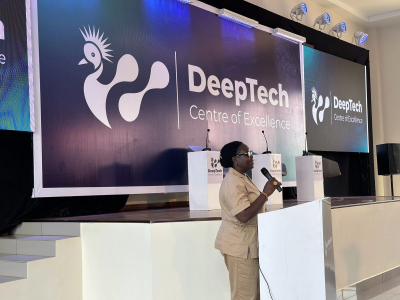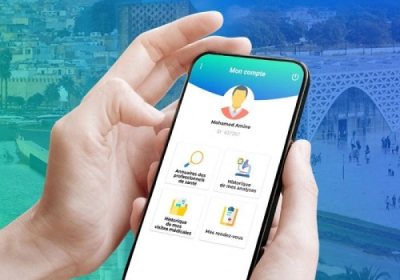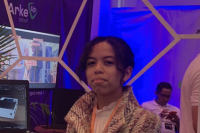Cameroonian authorities have centralized all online gaming payment solutions under a single operator. While justified by security concerns related to gambling, this move is negatively impacting the burgeoning African video game industry. In this interview, Olivier Madiba, founder and CEO of Kiro’o Games—Central Africa's first professional video game studio, recognized internationally for promoting African values through entertainment—discussed the detrimental effects of this government decision on his studio's operations.
We Are Tech: In a recent X post, you mentioned that the Cameroonian government's decision to grant exclusive online gaming payment rights to InTouch has disrupted your services. Could you explain how this decision has specifically affected your business as an online gaming provider focused on entertainment, not gambling?
Olivier Madiba : I believe the Ministry of Territorial Administration's directive was primarily intended for gambling and online lottery services. However, because the legal term "online games" was used, those of us in the video game industry, which falls under culture and entertainment, have been unfairly impacted.
It’s important to understand that we provide a cultural entertainment service. We offer video game enthusiasts a competitive alternative, allowing them to enjoy gaming experiences rooted in African cultural references. This is our way of contributing to a market largely dominated by Western or Asian models, particularly Japanese ones. In contrast, gambling and lottery games are financial bets that can generate monetary winnings and, indeed, may be used for money laundering.
To comply with the directive, we are now obliged to switch payment providers in just three weeks, after years of establishing stable payments with our existing provider. While many payment aggregators exist, very few are reliable. We had to painstakingly vet them, case by case, at significant research and development (R&D) cost.
Just as we were overcoming that challenge, being forced to use a single operator now poses a major threat to our digital economy. This monopoly gives the selected operator the power to dictate terms in the most critical area: cash flow.
To illustrate the impact, for over ten days, we've received no payments from our customers—not just for video games, but for all our cross-media activities, including coloring books, comic books, Rebuntu, and more. These are consequences the government should have anticipated. The onboarding process with InTouch is, understandably, lengthy, despite their team's goodwill.
For a startup like ours, if we were 100% dependent on the Cameroonian market, this decision could push us straight into bankruptcy. And yet, as I often say, I created this job from scratch—both for myself and for my team."
WAT: Given that the president has himself encouraged digital innovation, why is it vital to avoid exclusivity and prioritize a competitive environment within this fintech segment?
Olivier Madiba : Given that online payments in Francophone Africa are made at least 80% via Mobile Money—If I’m not mistaken—avoiding a monopoly in this sector is crucial for two key reasons.
First, many fintech companies that aggregate Mobile Money services count online gambling operators—lotteries, sports betting, and other online gaming platforms—as major clients. Removing this customer base would severely cut their revenue, threatening their survival and the jobs they support.
Second, competition among these fintech companies is key to ensuring quality service. Clients like Kiro’o Games have switched aggregators at least two or three times or use multiple providers simultaneously to maintain service stability. A monopoly would eliminate this crucial safeguard, eroding customer trust and damaging the entire digital ecosystem that's been built over years.
WAT : Do you understand the government's security argument for this decision? It seems that authorities have not fully grasp the consequences this could have on the digital product value chain. Given your experience and based on conversations with industry experts, are there viable alternatives to a single-operator monopoly?
Olivier Madiba : We understand and support the government's core decision to regulate and track financial flows related to online gambling. However, we believe this should have been done through discussions with key stakeholders who understand the ecosystem, ensuring harmony within the value chain and anticipating potential consequences.
It's important to recognize the fundamental difference between video game operators like us and gambling or lottery operators. Our players pay for an entertainment service they actively control. In contrast, gambling players pay for the uncertain hope of financial gain, over which they have virtually no control. This crucial distinction is why gambling requires a license, while our industry does not.
For instance, the government could establish clear conditions that payment aggregators must meet to process payments for online gambling, or even online gaming in general. These conditions could include mandatory participation in rigorous government audits or the implementation of monitoring and control protocols, similar to those in place for banks. Additionally, the government should clearly define "online gambling" to avoid conflating simple entertainment games with gambling, preventing unnecessary regulatory burdens on unrelated digital activities.
We also believe this decision should have been made in consultation with the Ministry of Finance and the Ministry of Posts and Telecommunications. These ministries have been instrumental in integrating finance and technology in Cameroon and could have provided valuable expertise. Their input would likely have helped anticipate potential implications and define appropriate measures to mitigate any negative impacts."
WAT : How is this decision being received in the fintech sector? Does it create regulatory uncertainty that could deter investors? Given that Central Africa, especially Cameroon, already attracts less venture capital than markets like Kenya or Nigeria, do you think this could further hinder investment in the region's fintech sector?
Olivier Madiba : We have closely followed the public policy developments on this issue, and indeed, the successive decisions made by the authorities have introduced a level of uncertainty. Fintech is highly sensitive to changes in the economic environment.
We are competing on a global scale, and to succeed, we need to operate as a united and well-structured ecosystem. In many countries where online payment services are thriving, regulation plays a crucial role. Just as a physical economy requires efficient financial infrastructure, a digital economy needs highly sophisticated payment channels. For investors, this demand represents a real opportunity, as every transaction generates fees.
Take, for example, the competition in money transfer solutions—it has clearly benefited customers. Costs have decreased, and transaction volumes have risen. Similarly, companies like ours have been able to grow in ways that would have seemed impossible a decade ago. Back then, few would have bet on the viability of such a business model.
From this perspective, introducing uncertainty or excessive market concentration in our digital economy would be a costly mistake in an increasingly digital world. While this monopoly decision may indeed enhance security, I sincerely believe we can achieve that important goal while maintaining a sufficient level of competition to protect consumers from the risks associated with a near-monopoly.
WAT : Can you provide a clear explanation of how the payment system functions in these transactions, outlining the roles of the key players? How has government intervention altered these dynamics, and what are the resulting opportunities and risks?
Olivier Madiba : Here's how a typical digital payment with Mobile Money works:
The customer initiates a payment in a video game (or application) where they want to purchase digital content–not for gambling.
The system prompts them for their phone number and email to generate a receipt.
Once the customer provides this information, Kiro'o's server connects with the payment aggregator's server.
The aggregator's server then communicates with the Mobile Money provider's server, either Orange or MTN.
The player completes the payment through Orange or MTN.
The payment confirmation is sent back to the aggregator, who then forwards it to us.
Finally, the player receives payment confirmation and the digital content within the game.
It took us years to refine this process. Finding a reliable aggregator to handle steps three through six flawlessly is incredibly difficult.
Many aggregators are simply unreliable. By imposing a monopoly on a single aggregator, you eliminate competition, which removes the incentive to improve their technology. This could result in payment failures in as many as half of all transactions. Imagine customers making payments that you can't validate, even though their money has been debited.
That's the risk inherent in this monopoly decision—it could severely damage hard-earned consumer trust, disrupt the payment value chain, and impede the president's goal of digitizing our economy.
Interview by Idriss Linge
As information and communication technologies (ICT) continue to expand, young people are demonstrating remarkable ingenuity in addressing the challenges of their time. Through the Orange Summer Challenge, telecom operator Orange showcases these talents and supports them in developing their innovative solutions.
Orange Summer Challenge, Orange’s international competition dedicated to responsible entrepreneurship in Africa and the Middle East, unveiled the winners of its 2nd international final on Tuesday, February 26, in Casablanca, Morocco. Three innovative startups were recognized for their potential impact: Plastikoo, MEPS, and Leevlong, selected for their solutions addressing environmental, health, and social challenges.
Over the course of three months, 282 young innovators from 14 countries received intensive support, including training, mentorship, and coaching provided by experts from Orange and its partners, including AWS, EY, and Nokia. In total, 57 startups emerged under the Tech4Impact theme, offering solutions in environment, health, education, and agriculture.
The first prize went to Plastikoo, a Malagasy startup that transforms plastic waste into sustainable construction materials, helping reduce pollution and promote sustainable community development. MEPS, a Tunisian startup that won second place, developed a solution to convert organic waste into biogas and fertilizer, contributing to the energy transition. Leevlong, a Cameroonian startup ranked third, offers a remote medical monitoring device for real-time patient tracking, improving healthcare management.
The winners will receive financial, technical, and commercial support from Orange Digital Centers and their partners. Nokia will provide a €40,000 grant to fund the pre-incubation and incubation of the projects, while Orange will contribute €20,000 to support these young entrepreneurs.
For Orange, this edition once again highlights the dynamism and creativity of young innovators. “For 15 years, the Orange Summer Challenge has supported thousands of young talents in their entrepreneurial journey. This new edition once again demonstrates the ability of African and Middle Eastern youth to innovate and address the societal challenges of our continent. Congratulations to the winners and all participants for their dedication and creativity,” said Brelotte Ba, Deputy CEO of Orange Africa and Middle East.
By Samira Njoya,
Editing by Sèna D. B. de Sodji
Manufacturing plays a crucial role in Africa's economy. Establishing these facilities is expected to further diversify the industrial base, foster resilience against economic fluctuations, and enhance self-sufficiency.
Uganda has launched a state-of-the-art Local Electronics Manufacturing Facility and the Deep Technology Centre of Excellence under the Ministry of Science, Technology, and Innovation. The initiative, unveiled on February 20, aligns with the government's commitment to Uganda’s National Development Plan III and strengthens the country’s position in high-tech manufacturing.
“This milestone is not only a leap forward in our Nation’s journey toward technological advancement and the qualitative leap but also a tangible demonstration of the Government’s commitment to operationalizing Uganda National Development Plan III, ” Minister of Energy and Mineral Development, Ruth Nankabirwa, stated in a LinkedIn post.
The Deep Technology Centre of Excellence is a modern facility dedicated to advancing innovation in emerging technologies, including Artificial Intelligence, Machine Learning, the Internet of Things, Robotics, Biotechnology, Advanced Materials, Cloud and Edge Computing, and Quantum Computing.
The launch highlights the power of public-private collaboration, with government ministries, private sector players, academia, and local communities encouraged to seize this opportunity for innovation and growth. The Energy sector is expected to benefit significantly from the local production of power meters at the center. This will enhance the national grid while enabling businesses and households to monitor and optimize energy consumption.
Beyond energy, the new facilities are set to create jobs, develop skills, and drive innovation, reducing Uganda’s reliance on imports and enhancing its global competitiveness. Officials emphasized that investing in local manufacturing will build a resilient economy and position Uganda as a leader in technology and industrialization.
Uganda's reliance on imported electrical and electronic equipment has been substantial, with imports projected to reach $429 million by 2028, up from an estimated $406 million in 2023. By investing in local manufacturing capabilities, the country can decrease this dependency, retaining capital within the economy and improving the trade balance.
Hikmatu Bilali
It's clear that Tunisia, like the rest of Africa, is moving irreversibly towards a digital economy. The rising popularity of electronic payments is creating a more inclusive, secure, and globally integrated financial landscape.
In 2024, electronic transactions in Tunisia totaled 27.891 billion dinars (approximately $8.8 billion), marking a 10.6% increase compared to the 25.230 billion dinars recorded the previous year. These figures were revealed by the Central Bank of Tunisia (BCT) in its 2024 Payments Bulletin, published on Monday, February 26. The growth reflects the increasing adoption of digital payment solutions, including mobile payments, online transactions, and the wider use of bank cards.
The sector's expansion is also evident in the significant rise in the number of transactions, which grew from 149 million to 163 million, a 9.4% increase in just one year. This momentum is driven by improved digital infrastructure, the rise of fintech companies, and government efforts to promote cashless payments as a means to boost financial inclusion and combat the informal economy.
Mobile Payments: A Key Driver of Digital Transformation
Mobile payments have become a key force behind Tunisia’s digital payment revolution. In 2024, 5.1 million transactions were conducted through electronic wallets, totaling 1.394 billion dinars—an increase of 21.4% compared to the previous year.
Most mobile transactions are concentrated in merchant payments (49.4%), peer-to-peer money transfers (36.6%), and cash deposit and withdrawal operations via e-wallets. This trend highlights the growing adoption of digital payment solutions, fueled by the expansion of active e-wallet accounts, which now number 368,595, managed by 15 payment service providers (PSPs).
Ongoing Modernization of the Payment System
To support this digital shift, the Central Bank of Tunisia is implementing several initiatives aimed at modernizing the payment ecosystem and enhancing transaction security. One key project is the TuniChèque platform, designed to digitize checks—still widely used in Tunisia. By gradually replacing paper checks with more secure electronic versions, this initiative seeks to reduce fraud risks and speed up payment processing.
Additionally, Tunisia is adopting the SWIFT ISO 20022 standard, which harmonizes financial messaging on a global scale. This transition is expected to facilitate the country’s integration into international monetary flows, improve transaction transparency, and enhance communication between banks and businesses.
Another major step is Tunisia’s membership in PAPSS (Pan-African Payment and Settlement System), a continental payment and settlement network. Developed under the auspices of the African Union and the African Export-Import Bank (Afreximbank), PAPSS enables intra-African transactions without relying on foreign currencies such as the dollar or euro. For Tunisia, this means lower costs for cross-border transfers and stronger integration into the African market.
Lastly, the Central Bank plans to extend the Elyssa-RTGS system to cover foreign currency transactions. This project aims to accelerate and secure cross-border payments by enabling real-time settlements, a significant advantage for Tunisian businesses operating internationally.
A Surge in Digital Transactions Across Africa
Tunisia’s digital transformation aligns with a broader trend across Africa, where electronic transactions are experiencing exponential growth. According to the "State of Instant Payments in Africa" report by AfricaNenda, instant payments across the continent reached approximately $1.036 trillion in 2023, with continued growth expected.
This shift is particularly evident in East and West Africa, where mobile payments dominate. Countries like Kenya (with M-Pesa), Ghana, and Nigeria have developed strong digital infrastructures that facilitate seamless transactions. North Africa is now following suit, with fintech innovations and mobile payment solutions on the rise.
The expansion of electronic payments in Africa could have profound economic implications. Greater financial inclusion will enable more citizens to access banking services and participate in the formal economy. Additionally, the digitization of payments enhances fiscal transparency and combats corruption by reducing reliance on cash, which is harder to trace.
However, one of the biggest challenges remains interoperability between different payment systems. Many services currently operate in silos, limiting the fluidity of cross-border transactions. Initiatives like PAPSS and the adoption of international standards are expected to gradually address these barriers, fostering a more interconnected African financial ecosystem.
By Samira Njoya,
Editing by Sèna D. B. de Sodji
As digital transformation emerges as a key driver for improving healthcare services, SehaLink is positioning itself as an innovative solution to enhance the medical journey of patients in Morocco.
SehaLink, a Moroccan startup, has developed a digital solution to centralize patient medical records, facilitating healthcare access and improving communication among healthcare professionals.
Founded in 2020 by Meryem Reneja, initially under the name ta7alil.ma, the Casablanca-based startup aims to streamline healthcare through digital technology.
"After living abroad, I saw how digitalized healthcare was in other countries, and I wanted to bring this advancement to my own country. My desire to contribute to this field grew even stronger when I became pregnant and struggled to manage all my medical tests and prescriptions on paper," Reneja said in a September 2023 interview with Le Monde Féminin, a French media dedicated to women.
SehaLink offers a mobile application, available on iOS and Android, allowing users to create accounts, book online appointments with general practitioners or specialists, and access their medical history.
A key feature of SehaLink is its ability to connect doctors, laboratories, pharmacies, and patients, enabling personalized medical follow-up, reducing information loss, and optimizing patient care management. The platform also improves healthcare access, particularly for patients in remote areas, and reduces waiting times through online scheduling.
"We plan to continue developing our health app, ta7alil.ma, by adding new features to provide even more comprehensive support for Moroccan patients. Additionally, we are exploring opportunities to collaborate with healthcare professionals to strengthen our impact. Eventually, we intend to expand internationally into other African countries," Reneja said.
By Adoni Conrad Quenum,
Editing by Feriol Bewa
Digital banking adoption is growing across the continent, driven by increasing smartphone penetration. However, rising digital fraud continues to pose significant security challenges. Strengthening authentication processes will help protect users, build trust in digital banking, and support the financial sector’s growth.
Digital identity verification and authentication provider Smile ID has announced a partnership with Plumery, a provider of digital banking experience systems, to enhance digital transformation and strengthen customer authentication for financial institutions across Africa.
Dustin Strydom, VP of Commercial at Smile ID, described the partnership as a pivotal step in strengthening financial security across Africa. He emphasized that integrating Plumery’s digital banking platform with Smile ID’s authentication technology provides scalable solutions that empower financial institutions in the digital era.
This collaboration allows banks, fintechs, and other financial institutions to integrate Plumery’s API-first digital banking platform with Smile ID’s advanced identity verification and fraud prevention tools. The integration aims to reduce implementation costs, improve authentication processes, and deliver secure, seamless digital banking experiences.
According to Smile ID's 2025 Fraud in Africa Report: Trends, Tactics, and Key Solutions to Tackle Fraud Effectively, digital banks experienced the highest fraud attempts in 2024, accounting for 35% of all biometric and document verifications, followed closely by microfinance institutions at 30%. These sectors remain prime targets for sophisticated schemes, including identity farming, account takeovers, and money laundering.
By embedding secure authentication processes directly into the digital banking journey, this collaboration enhances fraud detection, prevents account takeovers, and strengthens financial institutions’ ability to combat identity-related crimes
Hikmatu Bilali
Across Africa, artificial intelligence (AI) is becoming a major driver of digital innovation, reshaping industries and addressing critical issues. In Madagascar, AI is steadily improving social inclusion, opening up new possibilities for underserved populations.
Andréa Valéria Andriantefiarinesy (photo) is the co-founder BrA.I, the startup behind a device that instantly translates text into Braille using artificial intelligence, aiming to improve access to information for visually impaired individuals. From a graphic design background, she shifted her career path after joining the Advanced Design program at the Orange Digital Center (ODC). There, she met other young innovators and together they formed BrA.I, which won first place at the Orange Summer Challenge 2023 (OSC 2023).
"The idea came from a simple yet striking observation: access to information remains a major challenge for visually impaired people. While assistive technologies exist in developed countries, their high cost makes them inaccessible to most, especially those from disadvantaged backgrounds," Andriantefiarinesy said. "Our goal is to make these technologies affordable and widely available, enabling more visually impaired individuals to access information and gain independence."
Winning first place at OSC 2023 marked the beginning of an intense yet rewarding entrepreneurial journey. "It was a turning point: we had to decide the future of the project. Seeing the potential of BrA.I and the public’s enthusiasm for its deployment, we decided to pursue the venture and turn this idea into reality," she recalls.
The path was not without challenges. Some team members left the project for personal or professional reasons, requiring Andriantefiarinesy to assume strategic and operational leadership roles. "I had to learn how to manage a team, structure our work, and make tough decisions," she said. Thanks to incubation support and guidance from mentors like Rudy DEAL, IT & Digital Services Director at VIVETIC Group, she successfully navigated these challenges.
In 2024, BrA.I won second place and the Women’s Prize at the Orange Social Venture Prize for Africa and the Middle East. "This confirmed that our project meets a real need and that it was time to structure BrA.I into a full-fledged startup," she said.
Andriantefiarinesy envisions BrA.I becoming an essential tool for visually impaired individuals within five years, with at least one device in every institution. "Ultimately, we want BrA.I to become a personal device, used on demand just like a mobile phone," she said. "We’re aiming for large-scale adoption, with our device present in every household, providing a practical and accessible solution for daily life—both nationally and internationally."
In Africa, ghost employees are still exploiting outdated management systems to fraudulently collect salaries. To address this, many countries are implementing biometric technology, which provides a robust solution for securing workforce management and improving administrative transparency.
The Cameroonian government will introduce a biometric system to track the physical presence of public sector employees at their workplaces, Minister of Public Service and Administrative Reform Joseph LE announced Tuesday.Speaking at a press briefing aired on national public television on February 25, LE said the initiative aims to reduce absenteeism and eliminate ghost employees from the state payroll.
"By enabling a unique and tamper-proof identification of each employee, this system will ensure stricter workforce management. It will also enhance transparency within the administration and contribute to a vigorous fight against absenteeism, which has been strongly criticized in recent months by the highest authorities of our country," LE said.
The move is part of Cameroon’s broader digital transformation efforts, aligning with the country’s National Development Strategy 2030 (SND-30). It is also a key component of the “Aigle” program, launched in January, which seeks to modernize public administration through new technologies. The goal is to optimize public service management and improve government policy efficiency.
The biometric system will utilize technologies such as fingerprint scanners and facial recognition devices to verify employees' physical presence. Upon arrival, employees will authenticate themselves in real time, ensuring a secure and accurate attendance record. This tamper-proof identification method will guarantee employee authenticity and strengthen workforce monitoring.
While an exact implementation date was not provided, LE said the project will begin with a pilot phase in three key administrations: the Ministry of Public Service, the Ministry of Finance, and the Supreme State Audit Office. The pilot will be followed by a gradual rollout, accompanied by targeted training for managers to facilitate adoption and maximize the system’s effectiveness.
The introduction of biometrics in the public sector is expected to reduce administrative fraud, eliminate ghost employees, and optimize state resources. However, the system's implementation will face technical and ethical challenges, particularly concerning data protection and social acceptability. The ultimate goal is to clean up the public administration and eradicate ghost employees, who cost African governments tens of billions of CFA francs annually.
By Samira Njoya,
Editing by Sèna D. B. de Sodji
Regulating digital platforms is essential for Africa’s long-term digital sovereignty and inclusive growth. By ensuring fair revenue distribution, promoting local journalism, and preventing algorithmic bias, Africa can build a more sustainable and competitive digital ecosystem.
Google may have to pay up to R500 million ($27.29 million) annually to South African media outlets. This comes after the South African Competition Commission found it guilty of anti-competitive practices. The commission revealed this in its Media and Digital Platforms Market Inquiry (MDPMI) provisional report announced on February 24. Meta and X also face potential fines.
The Commission’s provisional report states that Google's algorithm favors global news over local South African media, weakening the country’s media industry for 14 years. To address this, it recommends Google compensate local publishers R300–R500 million annually for three to five years while adjusting its search algorithm to boost local referral traffic.
The Commission also urged Meta’s Facebook and X to stop deprioritizing South African news and restore referral traffic. It called on Meta and YouTube to increase revenue sharing for publishers.
If these companies fail to comply within six months of the final report, a 5–10% digital advertising levy may be imposed. The final report is expected later this year, with an April 7 deadline for evidence submissions.
The Journalism and Media Lab (Jamlab), a project of the Wits Centre for Journalism dedicated to fostering innovation in African journalism and media, highlighted in its Digital News Report 2023 that 57% of South Africans share news via social media.
The findings reinforce the South African Competition Commission’s concerns about Google, Meta, and X’s algorithmic bias against local media. With 57% of respondents sharing news via social media, global platforms wield significant influence over public discourse. If these platforms prioritize foreign media, local journalism loses visibility, revenue, and audience engagement, threatening its sustainability.
The Competition Commission's proposed remedies, including compensation for local outlets and fairer algorithmic representation, could help level the playing field, ensuring African stories reach both domestic and global audiences.
Hikmatu Bilali
Streamlining case reporting and evidence submission reduces delays in investigation and prosecution, ensuring swifter justice for survivors. Leveraging AI and digital tools can help break barriers to justice, empowering survivors, and holding perpetrators accountable. These innovations are essential in reducing domestic violence and ensuring a safer society for all.
The Lagos State Domestic and Sexual Violence Agency (DSVA) announced yesterday February 24 the introduction of two digital initiatives to enhance support for domestic violence survivors: an AI chatbot, Ask INU, and a self-reporting evidence portal. These initiatives aim to strengthen evidence collection, enhance access to services, and reduce domestic violence cases in Lagos State.
DSVA Executive Secretary Vivour-Adeniyi emphasized that these initiatives reaffirm Lagos State’s commitment to breaking the culture of silence, supporting survivors, and ensuring perpetrator accountability.
Ask INU (I Need You) is a WhatsApp-based chatbot that provides immediate information and referrals to survivors. Users can access support by sending a message to 0812 893 7058 on WhatsApp.
The Domestic and Sexual Violence Case Management System (DSVCMS) now includes a Self-Reporting Tool, allowing survivors and mandated reporters to securely submit case details and upload evidence via lagosdsvcms.org. The platform helps preserve crucial materials such as pictures, audio recordings, and medical reports—key for ensuring swift justice.
According to UN Women, approximately 1 in 3 women aged 15-49 in Nigeria have experienced physical or sexual violence. The introduction of digital support tools like Ask INU and the Self-Reporting Evidence Portal directly addresses a critical need for accessible, confidential, and efficient support services.
By providing immediate assistance via WhatsApp and secure evidence storage, DSVA is reducing barriers to reporting and ensuring survivors have a pathway to justice and support, ultimately strengthening efforts to combat domestic and sexual violence in Lagos State.
Hikmatu Bilali
More...
To simplify the lives of its citizens, the Nigerien government is implementing innovative solutions. These initiatives prioritize the modernization of public services and the promotion of digital technology access, ultimately supporting the country's economic and social progress.
Niger's autonomous pension fund, CARENI, inaugurated its new digital platform, "CARENI COLLECTE," on Monday, February 24, in Niamey, aiming to streamline pension registration and simplify access to benefits for over 35,000 Nigerien retirees. The retirees collectively receive over 3 billion CFA francs (approximately $5 million) per month.
“The CARENI COLLECTE application we are launching today is more than just digitalization—it represents a profound transformation in our management system,” said Ali Ousseini Hadiza (photo, center), Director General of CARENI. She emphasized that the platform is built around five key pillars, including a biometric card featuring a fingerprint and essential personal information, replacing the traditional booklet.
The biometric card will identify civil servants and facilitate access to medical coverage services, reducing the need for retirees to visit CARENI offices. This innovation is expected to eliminate long queues and repeated visits.
This project is part of a broader digital transformation initiative in Niger, as public institutions accelerate their shift toward e-governance. Like many countries, Niger aspires to enhance its global standing in digital administration. According to the latest United Nations e-Government Development Index, Niger ranks 187th out of 193 countries, with a score of 0.21157 out of 1. These figures highlight the urgent need for modernization in public administration.
The implementation of CARENI COLLECTE is expected to greatly improve pension access and healthcare services, ultimately enhancing retirees' quality of life. However, challenges remain, particularly in raising awareness and training users to navigate digital tools, as well as addressing connectivity issues in rural areas. Continuous support for retirees and ongoing improvements to the platform will be crucial to ensuring the initiative’s full success.
By Samira Njoya,
Editing by Sèna D. B. de Sodji
Through Used.ma, Anainiaa Reda is working to advance sustainable fashion in Morocco and Africa. The platform seeks to combine innovation, social impact, and environmental considerations within the second-hand market.
Anainiaa Reda (photo) is a graduate in organizational and strategic management from Ibn Tofail University. In 2022, he launched Used.ma an e-commerce platform specializing in the buying and selling of second-hand clothing, promoting circular fashion in Morocco and across Africa.
Through Used.ma, he merges his business acumen with his passion for the fashion industry, and his decision is already proving successful, with the platform winning third place in the Poesam (Orange Prize for Social Entrepreneurship in Africa and the Middle East) and second place in the Prix Maroc Jeunesse in the "Entrepreneurship" category in 2024. Used.ma is, in fact, the culmination of a long journey that began when Reda was in high school. He started reselling second-hand clothes for fun. This later turned into an avenue to sharpen his negotiation skills, get a glimpse into customer expectations, and gain expertise in supply chain management.Later, he founded a delivery startup, which provided deeper insights into logistics and optimizing customer experience. These ventures shaped his vision and prepared him to launch Used.ma.
Adapting to the Market
The idea for Used.ma emerged from a simple yet powerful observation: despite the global boom in second-hand fashion, Morocco's market remained largely unstructured. Reda identified three major challenges to tackle: lack of consumer trust, the complexity of buying and selling second-hand items, and the textile industry's environmental impact.
Used.ma offers an innovative solution that secures transactions, simplifies exchanges, and encourages more responsible consumption. Inspired by successful international models like Vinted and Depop, Reda tailors these platforms to local realities, considering the preferences of Moroccan and African consumers. His ability to innovate while drawing from proven strategies has been a key factor in his success.
Yet, he faced consumer reluctance to embrace online second-hand shopping and the challenge of building an attractive offering while managing his startup's growth. To overcome this, he adopted a gradual, user-focused approach centered on improving customer experience, listening to feedback, and raising awareness about the benefits of second-hand fashion.
Morocco and Beyond
Looking ahead, Reda envisions Used.ma becoming the leading platform for second-hand clothing and sustainable fashion in North and West Africa within five years. His ambition is to structure the circular fashion market in countries like Morocco, Tunisia, Egypt, Senegal, and Côte d'Ivoire, while building a committed community around sustainability and style.
Beyond creating a profitable business, Reda aims to make a positive social and environmental impact by reducing textile waste and promoting responsible consumption. At the same time, he is opening up economic opportunities for young entrepreneurs and independent resellers, giving them a platform to grow their businesses.
Ben Fatahou Nacro is providing an educational solution for the hundreds of thousands of children displaced by the security crisis in parts of Burkina Faso. His initiative has received support from companies like Orange and the Ministry of Education.
Pav Educ is a digital project developed by the Burkinabè company Universal Group, aimed at transcribing and distributing educational programs both physically (educational cards) and electronically (USB drives). The goal is to expand access to education nationwide and help students learn in an engaging way.
For the time being, the programs target preschool and primary school students. "Each set contains 120 double-sided cards, covering the six main subjects comprehensively," said project founder Ben Fatahou Nacro. The initiative has received approval from the Ministry of National Education.
During the launch of the pilot phase in November 2022, Boukary Yamyaogo, director of the Department of Educational Alternatives and Pedagogical Approaches at the Technical Secretariat for Education in Emergency Situations (ST ESU) praised the project saying:
“We are in a context that necessitates the development of distance learning tools, as some areas are difficult to access and schools are overwhelmed. This tool will allow children to continue learning in the absence of a teacher, though it cannot replace them. It directly addresses a pressing issue in emergency education by ensuring lessons are effectively delivered.”
In February 2024, Pav Educ was selected alongside four other startups for the second cohort of the "Demo Day" acceleration program under Orange Fab at Orange Digital Center. This six-month initiative aims to help these startups scale up and reach maturity.
By Adoni Conrad Quenum,
Editing by Feriol Bewa
Oze, a Ghanaian fintech startup supporting small businesses, has secured funding from Visa and German development finance institution DEG, it announced today February 24.
With this funding, Oze will expand its Lending Management System (LMS), enabling banks, microfinance institutions, and fintechs to offer no-collateral digital loans using its machine-learning credit risk algorithm.
Oze enables banks to automate lending while providing MSMEs with tools to track finances and customers. It analyzes this data to offer insights, training, and funding.


